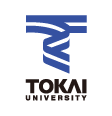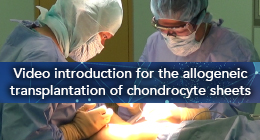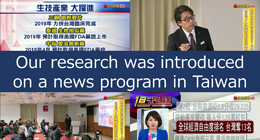FAQ
- Q : How do I receive the treatment? What are the costs?
- A : This treatment with allogeneic cell sheet is provided as a clinical study. Various selection criteria exist, so if interested, please first obtain a physician referral letter from your primary physician and then make an outpatient visit to the Department of Orthopaedics at Tokai University Hospital. The clinical study is covered by research funds, so the allogeneic cell sheet transplantation is done at no cost to the patient. The autologous cell sheet transplantation is currently offered as an advanced medical care. All costs associated with receiving advanced medical care (the portion for autologous cell sheet transplantation only) is the responsibility of the patient, although patients enrolled in medical insurance for advanced medical care may receive partial coverage.
- Q : What type of surgeries are required?
- A : Transplantation of allogeneic cell sheet will be performed during osteotomy surgery of the knee. Approximately a 5 cm incision will be made and the sheets will be directly transplanted to the defect areas. This procedure can be performed in a very short time. The regeneration of cartilage will be closely monitored after surgery periodically.
- Q : How long is the hospitalization period?
- A : The hospitalization period is about 1 month. This is the average hospitalization period for patients that undergo osteotomy. Transplantation of cell sheets does not extend the hospitalization period.
- Q : What are the differences between other methods of cartilage regeneration? What are the merits and demerits?
- A : A common procedure performed worldwide is called autologous chondrocyte implantation, or ACI, and has a record of over 40,000 cases. In this procedure, the patient’s chondrocytes are cultured for about a month and injected into the defect, and the tibial periosteum taken from the patient is sutured onto the defect to cover it.
Another type of treatment which is approved in Japan is J-TEC’s “JACC (pronounced ‘jack’),” and to receive insurance coverage, the knee joint must have cartilage defects caused by trauma or osteochondritis dissecans (excluding osteoarthritis) without other options for treatment, and at the same time, the cartilage defect must be larger than 4cm2.
Our clinical study using allogeneic cell sheets can be applied to cartilage defects in osteoarthritis patients. Also, allogeneic cell sheets can be applied to cartilage defects of any size without limitation. Autologous cell sheets for advanced medical care can be applied to cartilage defects up to 8.4cm2. - Q : What type of cells are used?
- A : For allogeneic cell sheet transplantation, cells collected from the tissue of polydactyly donors will be used to create the cell sheets. For autologous cell sheet transplantation, cells collected from the knee joint (cartilage and synovium) of the patient himself/herself have been used to create the cell sheets. Synovial cells collected from the synovium do not make up the cell sheet but assist in the expansion of chondrocytes taken from cartilage tissue. Cell sheets for transplantation is composed of only the chondrocytes.
- Q : Is this related to iPS cells?
- A : No. Allogeneic cell sheets used in this treatment will be created from cells collected from the tissue of polydactyly donors. Autologous cell sheets are created from the patients’ own cells (chondrocytes) and are not related to iPS cells.
- Q : Do cell sheets ever get torn apart?
- A : Cell sheets stick directly to cartilage around the defect, and the sheets cultured at relatively high cell densities do not tear easily even when pulled apart by hand.
- Q : How long is the treatment effective?
- A : The length of effectiveness will vary among patients. Even if the pain is relieved after effective treatment of the osteoarthritis, the possibility for the cartilage to deform over time still exists, making preventive exercise necessary.
- Q : How long does it take for the treatment to take effect?
- A : It varies with the patient, but from previous studies, many patients have reported improvements at three months after surgery.
Inquiry
Department of Orthopaedic Surgery,
Surgical Science, Tokai University School of Medicine
Masato Sato
E-mail:cellsheet@tokai.ac.jp
*Please contact us through e-mail for any inquiries.
*As we cannot respond to inquries regarding individual health and injury, you may not receive a response to such matters.
*For issues regarding health, please come to the hospital with a introduction letter to the outpatient office on Tuesdays to see Dr. Sato, or make a reservation for the second opinion outpatient with Dr. Sato.
http://www.fuzoku-hosp.tokai.ac.jp/patient/outpatient/
*E-mail from cell phone carrier addresses may not receive a response due to spam filters.
Unfortunately, we cannot accommodate inquires through the phone at this time.








